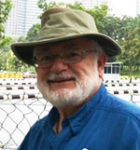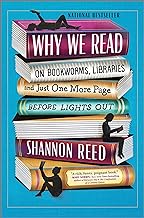Why We Read, on Bookworms, Libraries and Just One More Page Before Lights Out by Shannon Reed; Toronto, Canada: Hanover Square Press, 2024.
By Oliver B. Pollak

 RICHMOND, California — I plan a trip with the question, “What are we taking to read?” The quick answer, today’s New York Times, and the most recent New Yorker. Thicker, and not ephemera, books for research, and maybe one for leisure. Travel offers wonderful opportunities for stimulating new ideas. It is unplanned but it happens every time I leave home base.
RICHMOND, California — I plan a trip with the question, “What are we taking to read?” The quick answer, today’s New York Times, and the most recent New Yorker. Thicker, and not ephemera, books for research, and maybe one for leisure. Travel offers wonderful opportunities for stimulating new ideas. It is unplanned but it happens every time I leave home base.
We’ve been visiting Jackson Hole for Passover for over a decade. The Wilson Book Gallery, a small indie in Aspen Village, maintains a curated collection of three tables of brightly arranged recent titles situated in a manner to slow the patron’s browse. There are a few bookshelves showing book spines.
I enjoy books about books, print culture, reading, libraries, and the like, of which I possess a few hundred volumes. Karen opted for Shannon Reed’s second book Why We Read. Purchase made, time to read with the rubric of our editor Don Harrison in mind, “There is a Jewish story everywhere!”
Why We Read is an attractive, magnetic, and enigmatic title. There are many answers. Because I want to, because it is satisfying, because it is good for my mind, because a book is a friend, because a book is an escape, and because I can only begin to cover Reed’s analysis.
The antithesis of the question, why we don’t read, why we don’t go to bookstores, and libraries, also receives attention. That answer, deeper than illiteracy may include self-appraisals and experiences of intimidation, too difficult, turned off. Cultural literacy competes with a crowded distracting schedule of employment, family responsibilities, past disappointment, economics, and the cellphone. One of Reed’s teaching jobs included a roundtrip bus ride totaling three hours, she read prodigiously.
Shannon’s birth family name “Reed,” is a homophone for “read.” Her father is a pastor. She was an active early reader. She traces her early reading, weekly trips to the library with her mother, her first junior library card, adolescence, Young Adult reading, and adulthood. An appendix lists about 180 books specifically discussed, many more books and authors mentioned. She worked in the publishing industry, taught English in high school. She earned her MFA at NYU, a few blocks from the famed Strand Book Store. For the last several years she has taught college students English and creative writing. She currently teaches at the University of Pittsburgh. Her first book Why Did I Get a B? And Other Mysteries We’re Discussing in the Faculty Lounge appeared in 2020.
She writes about students, friends, and colleagues. The book was written during the pandemic. Although the author refers to Kosher salt, and uses the words mensch and meshuga, they are not the Jewish hooks.
Imagine the daughter of a Protestant minister teaching The Diary of a Young Girl written by Anne Frank while she was hiding in Amsterdam, to a classroom in an all-girls Roman Catholic high school that included a girl from Rwanda. She was a substitute teacher using the syllabus of the teacher on leave. The students were assigned to read the book over the summer and respond to the question, “What is the main point of this book?” The initial responses were on the order of “Bad things happen, but people are still good,” and “I think she wrote it to show us how to be brave.” Reed concluded, “most of them said they would have protected the Franks.”
Then “miracle of miracle,” a Fidler on the Roof trope, one girl spoke up and read her answer, “I would not have protected the Franks….I like being alive and I would have been scared of the Nazis.” Reed responds, “Talk about bravery.” These were among “the bravest things I’ve ever seen a student do: willingly admit her lack of moral courage.” The Rwandan student quietly spoke up, “My family didn’t help anyone.”
Sometimes a writer presses buttons that have extra meaning for the reader. For example Reed discusses cookbooks, working in a library, the Index to Periodical Literature, shifting from Dewey Decimal System to Library of Congress Classification, wine, haiku, CliffNotes, pet peeve faulty grammar, situations where there is a discussion about a book you have not read, but can be expected to have read, Neville Shute’s 1957 Cold War novel, On the Beach, and experiments with innovative dialogue footnotes, a few of the resonating experiences. This imaginative memoir about the profession of reading is pleasantly consoling.
*
Oliver B. Pollak, Ph.D., J.D., professor emeritus of history at the University of Nebraska at Omaha, a lawyer, a member of the Institute for Historical Study, the Book Club of California, and is a correspondent based in Richmond, California.